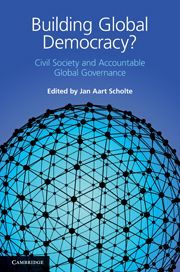Book contents
- Frontmatter
- Contents
- List of figures
- Participants in the Gothenburg Workshop
- List of contributors
- Editor's acknowledgements
- List of abbreviations
- Introduction
- 1 Global governance, accountability and civil society
- 2 Civil society and accountability of the United Nations
- 3 The World Bank and democratic accountability: the role of civil society
- 4 Civil society and IMF accountability
- 5 Civil society and the WTO: contesting accountability
- 6 Civil society and accountability in the Commonwealth
- 7 The Organisation of the Islamic Conference: accountability and civil society
- 8 Civil society and patterns of accountability in the OECD
- 9 Civil society and G8 accountability
- 10 Structuring accountability: civil society and the Asia-Europe Meeting
- 11 Civil society and accountability in the global governance of climate change
- 12 Civil society and accountability promotion in the Global Fund
- 13 Accountability in private global governance: ICANN and civil society
- 14 Civil society and the World Fair Trade Organization: developing responsive accountability
- Conclusion
- Bibliography
- Index
7 - The Organisation of the Islamic Conference: accountability and civil society
Published online by Cambridge University Press: 05 June 2012
- Frontmatter
- Contents
- List of figures
- Participants in the Gothenburg Workshop
- List of contributors
- Editor's acknowledgements
- List of abbreviations
- Introduction
- 1 Global governance, accountability and civil society
- 2 Civil society and accountability of the United Nations
- 3 The World Bank and democratic accountability: the role of civil society
- 4 Civil society and IMF accountability
- 5 Civil society and the WTO: contesting accountability
- 6 Civil society and accountability in the Commonwealth
- 7 The Organisation of the Islamic Conference: accountability and civil society
- 8 Civil society and patterns of accountability in the OECD
- 9 Civil society and G8 accountability
- 10 Structuring accountability: civil society and the Asia-Europe Meeting
- 11 Civil society and accountability in the global governance of climate change
- 12 Civil society and accountability promotion in the Global Fund
- 13 Accountability in private global governance: ICANN and civil society
- 14 Civil society and the World Fair Trade Organization: developing responsive accountability
- Conclusion
- Bibliography
- Index
Summary
Introduction
The Organisation of the Islamic Conference (OIC) is an instance of global governance where, in contrast to the other institutions examined in this book, religion figures centrally as a unifying factor. Inclusion of the OIC in the present volume is also important as an indication that not all global governance is Western in orientation and dominated by Western countries. Likewise, as the case of the OIC demonstrates, ideas and practices of accountability and civil society do not always adopt a Western pattern.
Established in 1969, the OIC claims to be, and is often perceived as, the ‘United Nations’ of the Islamic world. Its membership of fifty-seven states across four continents (Africa, Asia, Europe and Latin America) covers most of the world's 1.5 billion Muslims and more than a fifth of the world's total population. Several other states with notable Muslim populations, such as Bosnia-Herzegovina, Russia and Thailand have observer status with the OIC.
The OIC puts its emphasis on Islam as a global religion that transcends ethnic and sectarian differences. That said, the Organisation has a highly diverse membership geographically, socially, linguistically and culturally. This diversity often raises challenges of intercultural communication in forging a unified organisation from a heterogeneous membership.
The OIC embraces issues that touch all countries with Muslim communities. The member states pool resources, combine efforts and speak with one voice in order to safeguard their interests and ensure the progress and wellbeing of their peoples and those of other Muslims the world over.
- Type
- Chapter
- Information
- Building Global Democracy?Civil Society and Accountable Global Governance, pp. 146 - 162Publisher: Cambridge University PressPrint publication year: 2011
- 2
- Cited by

